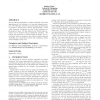Free Online Productivity Tools
i2Speak
i2Symbol
i2OCR
iTex2Img
iWeb2Print
iWeb2Shot
i2Type
iPdf2Split
iPdf2Merge
i2Bopomofo
i2Arabic
i2Style
i2Image
i2PDF
iLatex2Rtf
Sci2ools
127
click to vote
STOC
2003
ACM
2003
ACM
Approximate counting by dynamic programming
We give efficient algorithms to sample uniformly, and count approximately, the solutions to a zero-one knapsack problem. The algorithm is based on using dynamic programming to provide a deterministic relative approximation. Then "dart throwing" techniques are used to give arbitrary approximation ratios. We also indicate how further improvements can be obtained using randomized rounding. We extend the approach to several related problems: the mconstraint zero-one knapsack, the general integer knapsack (including its m-constraint version) and contingency tables with constantly many rows. Categories and Subject Descriptors F.2 [Theory of Computation]: Analysis of Algorithms; G.3 [Mathematics of Computing]: Probability. General Terms Algorithms, Theory.
Algorithms | Arbitrary Approximation Ratios | Deterministic Relative Approximation | STOC 2003 | Zero-one Knapsack |
Related Content
| Added | 03 Dec 2009 |
| Updated | 03 Dec 2009 |
| Type | Conference |
| Year | 2003 |
| Where | STOC |
| Authors | Martin E. Dyer |
Comments (0)

